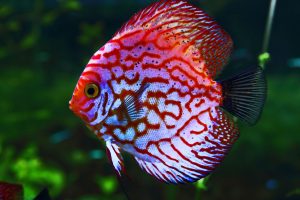On the surface, the differences between freshwater fish and saltwater fish are obvious: one lives in saltwater and the other lives in freshwater. If you delve deeper into the issue, however, you’ll see there are actually several less apparent differences based on the biology and history of the fish.
In fact, you could say the two different types of fish are from different worlds.
The Main Differences Between Freshwater Fish and Saltwater Fish
Let’s start with some basic definitions. Saltwater typically refers to water found in oceans and seas, and freshwater is found in lakes, rivers, ponds, and streams. Freshwater only accounts for less than 3 percent of all the water on earth, but ironically, freshwater fish make up almost half of all fish species.
The way fish take in and eliminate water is perhaps the most significant difference between saltwater and freshwater fish. Fishes’ natural biological functions compensate for the environment in which they live in order to survive.
Both types of fish need salt in order to survive, but the way their bodies function is actually the opposite of what one may expect.
A saltwater fish’s body contains less salt than the water around it. In order to prevent dehydration, it takes in a large amount of water and secretes the salt through its gills. In other words, it’s saltwater in and salt out on a regular basis. Saltwater fish produce very little urine in order to hold onto the now more pure water created through this elimination of excess salt.
A freshwater fish, on the other hand, does hold onto the salt in its body because there isn’t as much of it in its environment. It takes water in through its skin and gills all the time in order to stay healthy. As a result, it produces much more urine than saltwater fish.
Other Notable Differences
- Because the bodies of water that freshwater live in are smaller than oceans and seas, the body of water itself changes over time. As a result, freshwater fish may be tougher and can adapt to their environments easier than saltwater fish do. Saltwater fish that live in abundance of space are accustomed to a more stable lifestyle. As a result, taking care of saltwater fish in an aquarium may be a little more challenging.
- Freshwater fish can be coldwater fish or tropical fish, while saltwater fish are almost all coldwater fish, which means they are comfortable in slightly cooler water.
- Saltwater fish tend to be more colorful and diverse in their appearance as a result of how they live and behave in their natural habitat in the ocean or sea.
- A few types of fish and other animals can live in either saltwater or freshwater, although it’s not common.
Brackish Fish
Some types of fish live in brackish water, which is where freshwater meets saltwater and where rivers flow into oceans. There isn’t a big selection of these fish, called brackish fish, in the aquarium hobby, although some hobbyists do keep brackish tanks.
Breeds of brackish fish include drum fish, tigerfish, Asian cichlids, halfbeak fish, flagfish, and scats.







 • In the wild, they’re found in schools, so if you do want to own discus fish, you should have several of them in your
• In the wild, they’re found in schools, so if you do want to own discus fish, you should have several of them in your